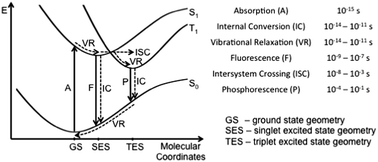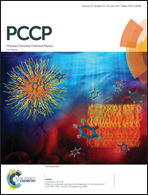Can time-dependent density functional theory predict intersystem crossing in organic chromophores? A case study on benzo(bis)-X-diazole based donor–acceptor–donor type molecules†
Abstract
Here we utilized new diagnostic tools in time-dependent density functional theory to explain the trend of intersystem crossing in benzo(bis)-X-diazole based donor–acceptor–donor type molecules. These molecules display a wide range of fluorescence quantum yields and triplet yields, making them excellent candidates for testing the validity of these diagnostic tools. We believe that these tools are cost-effective and can be applied to structurally similar organic chromophores to predict/explain the trends of intersystem crossing, and thus fluorescence quantum yields and triplet yields without the use of complex and expensive multireference configuration interaction or multireference pertubation theory methods.



 Please wait while we load your content...
Please wait while we load your content...